Isabelle Huppert: ‘I was never the woman behind the man… the only place I could take was the main place’
As brings to London a 90-minute monologue about Mary, Queen of Scots, the celebrated French actor talks about her extraordinary career, and why she’d love to make a film in the UK – or play a Marvel villain. Below, Guy Lodge chooses her finest screen appearances
Sarah Crompton
Sun 24 Mar 2024 07.00 GMT
Isabelle Huppert is a force of nature. Two days before we meet, she has arrived in Stockholm from New York via Paris. Two hours after she touched down, she was on stage rehearsing. The next evening, she opened in Mary Said What She Said, an extraordinary one-woman portrait of Mary Stuart, Queen of Scots. Then she walked back to her hotel in high heels, through five inches of snow.
Now, she is sitting opposite me in an empty rooftop bar, especially reserved for our conversation. Drinking citron pressé, as the Scandinavian light seeps away through the early afternoon, she looks tired when she arrives but soon relaxes: her face is full of life.
The first night had been nerve-racking. “It’s always a bit of turmoil,” she says, with a low laugh. “Theatre is the most unusual situation. It is so difficult. You are alone – in this case – in front of hundreds of people, and yet you do it. It goes from horror to splendour. The splendour comes quite quickly, but the beginning is always close to horror. On an opening night, the horror is even more intense.”
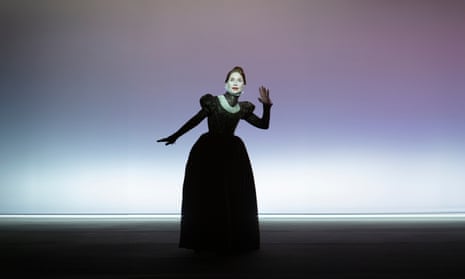
Whatever she is feeling, her performance in Mary Said What She Said, a monologue written by Darryl Pinckney and directed by the veteran American experimentalist Robert Wilson, is astounding. Alone on stage for 90 minutes, she performs something between a rite and an elaborate courtly dance, her stylised, repetitive movements and moments of stillness accompanied by Pinckney’s poetic script casting a spell over her audience.
The play doesn’t so much tell the tragic story of Mary, Queen of Scots – though by the close of it you will know the broad outline – as summon her spirit. For a work by Wilson, who specialises in memorable images and slow movement, I hadn’t expected it to be so physical. “Neither did I,” says Huppert with a gentle smile. “I’m alone, but I’m not lonely because I am mentally, emotionally and spiritually very much surrounded, you know, because of all these people I am talking to. Plus, I have so much to do – the dancing, the different levels of voices. It keeps me very busy.”
She laughs. This is her third collaboration with Wilson – she has previously appeared in the monologue Orlando and in Quartett, a four-person reimagining of Les Liaisons Dangereuses. “I think he is a genius, one of the great, great theatre inventors of our century. I like the fact that he completely dictates what he wants. It’s always prepared not improvised. I do what I am asked to do because that gives me a lot of freedom. Even though it’s very precise, I feel completely free.”
This is how Huppert operates. Whether on film or on stage, she finds a director she admires and trusts and then puts herself entirely at their service. She steps into a frame set by someone else and empties herself into it. “There are so many limits and there is no limit,” she says. “It is a very, very strange feeling. Each work and each director has their own universe. I do this, but I am always able to do something different.”
Thanks to her ferocious work ethic, that means that in the past five years on stage she has starred in New York in Florian Zeller’s The Mother, in The Glass Menagerie (directed by Ivo Van Hove) in Amsterdam and The Cherry Orchard directed by the Portuguese star Tiago Rodrigues in Avignon. After Stockholm, and before the work comes to the Barbican, she squeezes in a new version of Racine’s Bérénice in Paris, directed by the Italian Romeo Castellucci, in which she is the only speaking character on stage.
On film, over the same period, she has played, among other roles, the snooty gatekeeper of a fashion house in Mrs Harris Goes to Paris, a trade union official who is raped and whom no one believes in The Sitting Duck (La Syndicaliste is its better French title) and an eccentric silent movie star in a red wig in François Ozon’s broad comedy The Crime is Mine. When we meet, she has just finished filming her second movie with the French director Patricia Mazuy, Les prisonnières, in which she plays the suburban wife of a convicted prisoner, and completed A Traveler’s Needs, her third with innovative Korean director Hong Sang-soo.
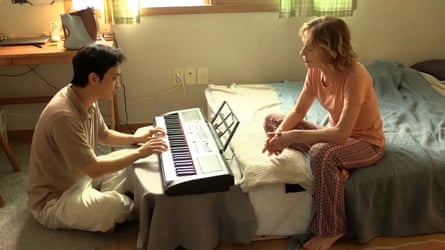
That film won the Silver Bear at the Berlin film festival last month and Huppert found time to fly in for 24 hours and “do everything I had to do”. “He is so special,” she says, of Sang-soo’s bare-bones aesthetic. “The last two films we made were maybe six or seven people. Now it’s three. He does everything by himself – camera, lighting. He is like a little genius for me. The language of his films is so sophisticated, so smart. It’s very much worked, not improvised. You rehearse and you think, and you do it in 10 days.”
She is always reluctant to rule anything out. Even Marvel, I ask? She smiles broadly again. “I would love to! I’d love to do a genre film. It must be nice maybe to be the villain – a real villain, not the villain in most of the films I do, who have a good reason to be a villain. I never get to play a pure villain.”
It is this willingness to try anything that makes Huppert’s career so astonishingly varied. That plus her constant workload, of course, which she gently spoofed in an episode of Dix pour cent (Call My Agent!) about the workings of a French talent agency. Her guest appearance showed her making an American film by day and a French historical drama by night, while fitting in interviews on top. “That was slightly exaggerated,” she says, raising her eyebrows. “With my complicity. It was a lot funnier to make it worse than it is. Even if it is also sometimes true.”
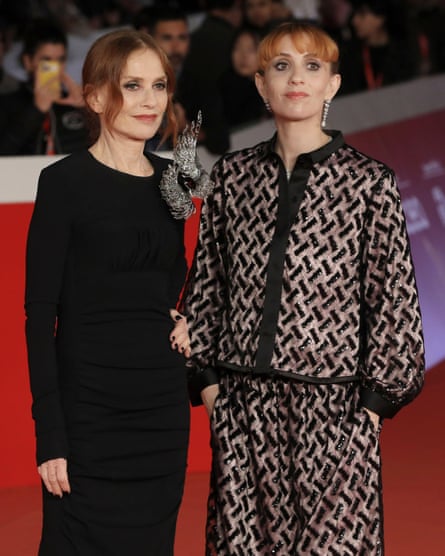
She laughs again and nestles further into the corner of a sofa. She is dressed in a soft pink sweater by Balenciaga (for whom she is a brand ambassador), black trousers and shiny trainers. She wears silver earrings but very little makeup and looks both fragile and beautiful. The director Claire Denis once described her as a “twig made of iron” which summarises her air of both elegant fragility and indomitability.
At 71, she shows no sign of slowing down. It is not only the workload but her attitude that is so remarkable. Charles Chemin, associate director of Mary Said What She Said, thinks that her commitment puts many younger actors to shame. “Isabelle’s relentless. She doesn’t let go; she goes to the bottom of it. She has such openness of mind and freedom. It’s incredible to work with someone with that kind of aura, that kind of fame, yet who gives so much with so much precision for so many hours.”
Huppert herself dismisses the notion that this is somehow special. “I’m not sure I feel like I work, that’s the essential point,” she says. “Of course, it is work. But work is something very different for many people. Sometimes, unfortunately, work can be surviving, it can be difficult. You can spend your life doing something that you don’t really like doing and I guess in this case some part of your brain can focus on something else. But in my case, I have this immense privilege to do something that I love. So that’s why I can’t really call it work. It’s something different.”
It is clear that her work and life do blur into each other. She never talks about her family, but she has been with her partner, the director and producer Ronald Chammah, for 40 years and film seems to be a family business. Her daughter, Lolita, is an actor who has appeared on screen alongside her. One son, Lorenzo, runs an arthouse cinema in Paris; the other, Angelo, is making tentative steps in producing. When Huppert isn’t working, she is often watching theatre and dance. “I am a good spectator and I am very curious. I like to see as much as I can.”
When I ask her what she does to relax, she seems – despite her fluent English – barely to understand the question. “I never really saw life as a time when you relax and a time when you don’t relax. Sometimes, you do nothing and it is not very relaxing; and sometimes, you work a lot and it is relaxing. That is how I feel.”
The women Huppert plays on stage and screen may be various, but they rarely lack agency. She is a walking denial of the Bechdel test, which judges whether women in film, theatre or fiction only appear to talk about men. Whether playing Madame Bovary in Claude Chabrol’s version of Flaubert, or a woman with sadomasochistic fantasies in Michael Haneke’s The Piano Teacher, or in her Oscar-nominated depiction of a rape survivor who seeks revenge in Paul Verhoeven’s Elle, Huppert is drawn to the complex, the powerful and the difficult. According to the industry bible IMDb, she has made 154 films as an actor and, even when she plays a supporting role, she is never a shrinking violet.
“From the beginning, that was a conscious choice,” she says, “but at the same time I had no choice, because I was never really asked to be the woman sitting behind the man, the woman giving value to the man. You have to be a certain type of woman [to be that]. That was never my case, so in a way, the only place I could take was the main place. Which was fine.”
Does she see that as a feminist act? “Yes, but in a very selfish way, not as a very political statement,” she says, thoughtfully. “At the end of the day, of course it’s feminist to give the main position to the female character in the film. But I think that the feminist statement would have to fight for some bigger purposes. Like equality of salaries between men and women, equality of access to work, women being better treated in many circumstances.”
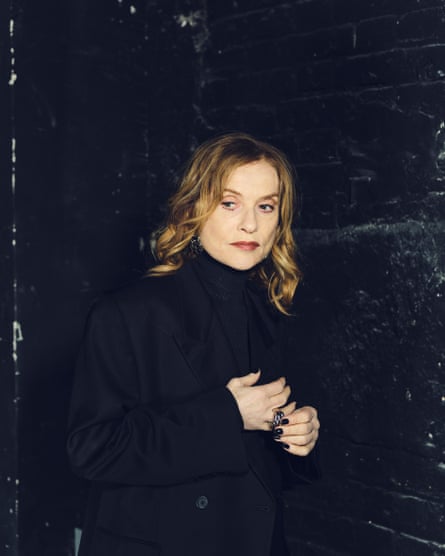
She believes all these things should happen, just as she gives her support to women fighting abuse – not only in the film industry, where it has been a hot topic in France of late, but also, she stresses, in their lives. “Of course, it is a good thing that women are more and more protected in their work, in their life, all over the world, and not only in cinema,” she says. “You can only be happy about a perspective like this. The more you put things in place to protect women from aggression, from all the bad things that can happen to them, it’s only good news.”
You sense her wariness of describing herself as a campaigner in any way. Her contribution feels individual rather than collective and has something to do with the women she represents on screen, who are often fighting to achieve something. Her recent role in La Syndicaliste, based on the true story of Maureen Kearney – a union leader who was accused of lying about being violently sexually assaulted after she had drawn attention to China’s involvement in the French nuclear industry – is a case in point.
In the film, part of the problem for Kearney is that she doesn’t behave in a way that women are expected to behave after being attacked and Huppert endows her with striking, silent dignity. Like many of her roles, it requires her to be both emotionally and physically naked. Her capacity to suggest feeling beneath an enigmatic surface is one of the qualities that make her performances so haunting.
I suggest that she must be fearless to approach such depictions of sexual violence and brutality as she undertook in La syndicaliste and Elle. “I never think I am doing something fearlessly,” she says. “Or that it requires a certain amount of anxiety. I trust cinema in general. That gives you a lot of protection from everything. It takes you away from fear, from all that – I have to say – bullshit that people imagine you have to deal with when you do a movie like this.
“When you do a movie with, say, Michael Haneke or Paul Verhoeven, they are people I trust enough to give me confidence. I feel completely safe. I know exactly what I am doing. As a spectator, I can imagine that people think the actors are particularly exposed because that is what the movie is about. But that is the film. It is not me doing the film.”
She makes no distinction between her work on screen and in the theatre; they all blend into a seamless whole. “I don’t do theatre because I find something that I wouldn’t find in cinema,” she says. “I don’t see them as contrasting. The differences between stage acting and film acting don’t exist any more. The main difference, a long time ago, would have been the projection of the voice and now, even if you don’t have microphones, you don’t do it any more.” She briefly mimics throwing her voice into the room. “The whole interaction between spectator and actor has changed.”
The length of Huppert’s career gives her this kind of perspective. She is enclosed by a halo of glamorous adventurousness. She first encountered Robert Wilson’s work, for example, “under very strange and unusual circumstances” when she attended a festival in Shiraz, Iran, in 1972, highlights of which included a performance of Stockhausen in the ruins of Persepolis. Huppert was there with a small theatre company and after their performance they went to watch Wilson’s Ka Mountain and Guardenia Terrace, which lasted for seven days. “We would go to the top of this hill and watch in complete disbelief. There were lots of animals and the performers would come across the stage very, very slowly, in this dreamy walking. It was just amazing.”
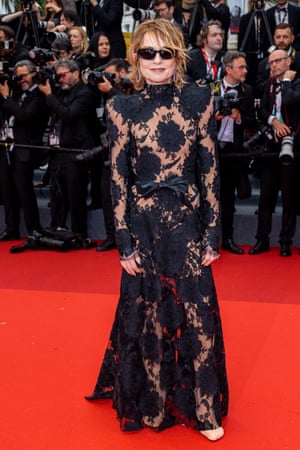
At the Killers of the Flower Moon premiere, Isabelle Huppert’s feet caused an is she/isn’t she barefoot moment. With a moulded toe design, her Anatomic heels from Balenciaga are meant to resemble a naked human foot. She upped the naked-esque mood with a sheer lace dress from the brand and wrap-around shades.
Photograph: Marc Piasecki
Y ears later, she met Wilson at a dinner party thrown by Pierre Bergé, Yves St Laurent’s longtime business partner. “I didn’t want to go, I was so tired. But if I hadn’t gone to that little dinner that evening, I would never have met him.”
She is particularly pleased to be bringing Wilson’s work to London, where it is not often seen. The city and Mary, Queen of Scots both have fond memories for her since she was there for nine months in 1996. She was playing Mary Stuart at the National Theatre in Schiller’s version of her story, in which he invents an encounter between the Scottish queen and her rival, Elizabeth I, before Mary is executed at Elizabeth’s command in 1587. “It was with lovely Anna Massey [as Elizabeth I], and lovely Tim Pigott-Smith,” she says. Ben Miles, who she saw a few years back in The Lehman Trilogy, also had a small part. “I was like, oh my god, I haven’t seen him since he was very young.”
That was Huppert’s first major stage role in English. “It was tough. I mean theatre is tough, no matter what, it’s really scary. But imagine doing it at the National Theatre in English. You have to be very brave. But I am glad I did it. It was a very good experience. I love being in London.”
She was last at the Barbican more than seven years ago, in Krzysztof Warlikowski’s radical production Phaedra(s), three versions of plays about the mythological queen who fell in love with her stepson. “It’s always nice when these connections occur between England and France,” she says. Then she adds: “But I’ve never done a movie in England. That’s one of the only European countries where I haven’t worked.” Would she like to? “Yes, because you have really wonderful people like Joanna Hogg and Andrea Arnold. Really great women directors.”
By this time, Huppert has settled in to the point where it feels as if she could talk for ever. But night is falling, and the stage is calling and she once again needs to give it her all. “The stage gives you a certain amount of excitement, which gives you all the energy you need. Once you step on a stage, it’s like you have electricity in your body and your mind.” Electricity is what Huppert has in every fibre of her being. No wonder she doesn’t ever relax. She just wants to act.
Mary Said What She Said is at the Barbican theatre, London, 10-12 May
Isabelle Huppert film highlights, chosen by Guy Lodge
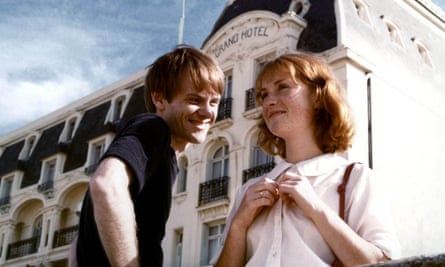
Huppert and Yves Beneyton in The Lacemaker.The Lacemaker (1977)
Then 24, Huppert established herself as a leading lady (and won a Bafta) in this delicate character study, playing an introverted, virginal young woman driven to madness by her first love affair. Those familiar with Huppert’s signature severity in her later career may be startled by her soft vulnerability here.
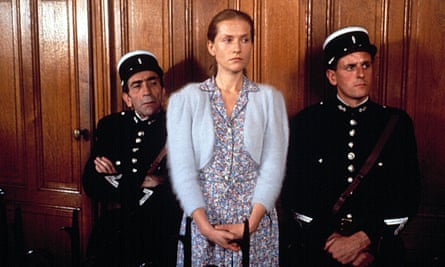
Story of Women (1988)
Huppert’s collaboration with director Claude Chabrol spanned seven films, winning her a César for La Cérémonie, a Cannes award for Violette Nozière, and a Venice prize for this, the best of them: playing real-life abortionist Marie-Louise Giraud, guillotined in 1943 for her services to women, she’s steely and shattering.
The Piano Teacher (2001)
Huppert joined the elite group of two-time Cannes best actress winners with her fearless performance in Michael Haneke’s scarring psychodrama. As a sexually repressed conservatory professor entering a sadomasochistic relationship with a much younger student, she revitalised her career on bold new terms.
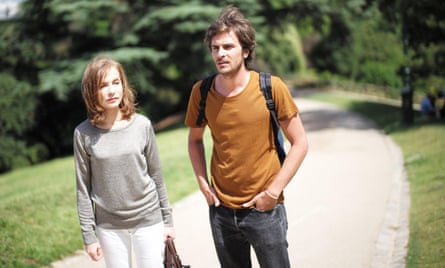
Things to Come (2016)
An annus mirabilis for Huppert began with her disarmingly funny, wounded turn as a philosophy teacher blindsided by divorce in Mia Hansen-Løve’s exquisitely observed story of middle-aged liberation. In her later career, the actor has rarely been this gently ordinary on screen; it’s a light-touch performance that still cuts deep.
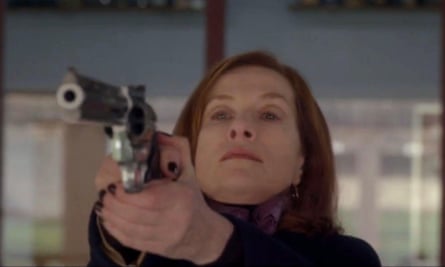
Elle (2016)
Mere months after Things to Come, Huppert pivoted back into lightning-rod territory in Paul Verhoeven’s dark psychothriller, playing a rape survivor who initiates a perverse cat-and-mouse game with her assailant. It may be the quintessential Huppert role, marrying roiling psychological curiosity with acid wit, and it earned her a belated first Oscar nomination.


No comments:
Post a Comment